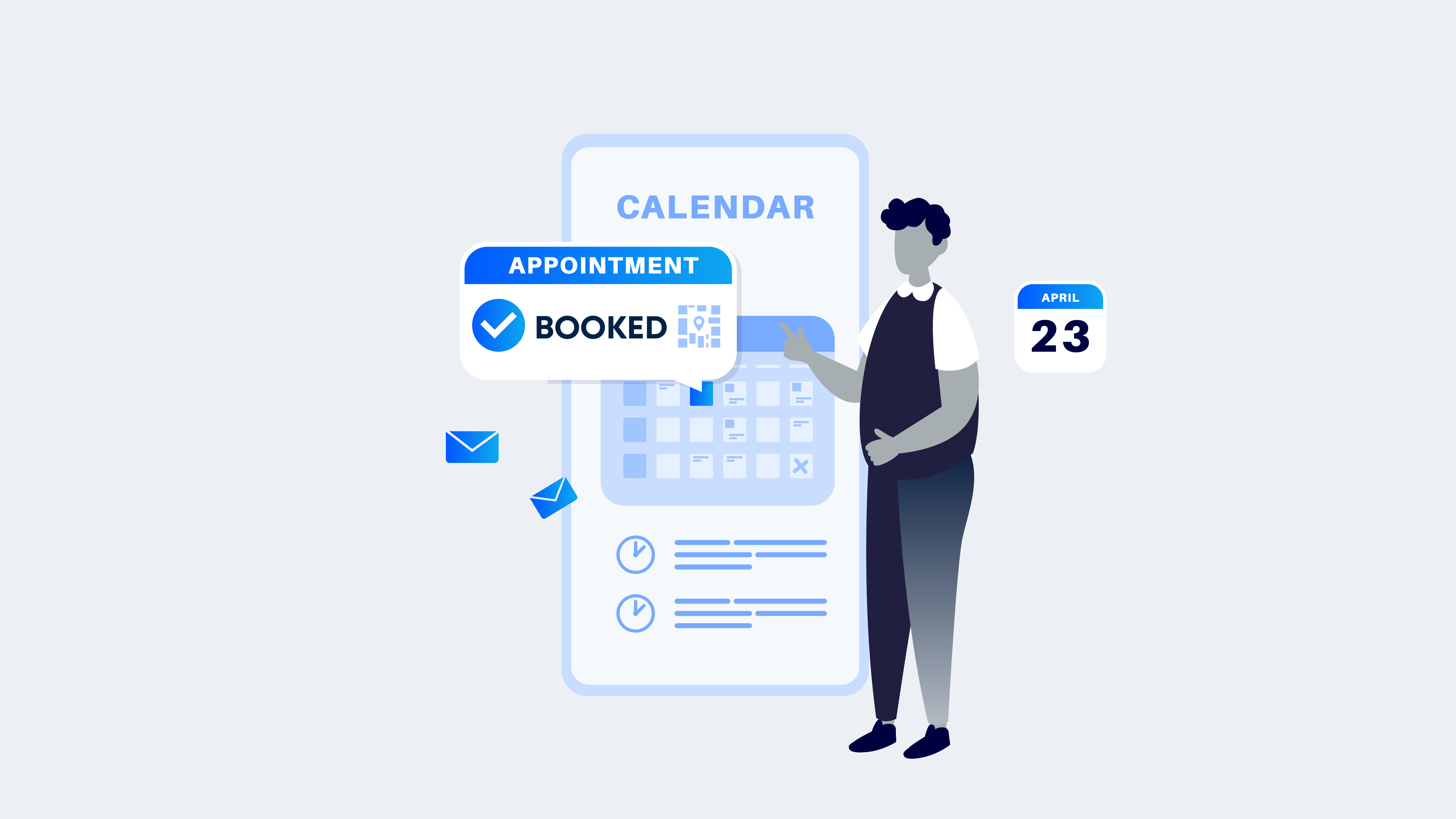8 Best Scheduling Software for Small Businesses
Online booking is a customer non-negotiable. But which platform is right for your small business? Keep reading for a breakdown of the top eight tools.

There’s a reason the term “home phone” is going the way of the floppy disk. With increased reliance on texting, email, and other digital methods to communicate, phone calls are becoming the last resort for many customers.
In a Bank My Cell survey, 75% of millennials revealed that they avoid phone calls that they deem time-consuming and 81% of millennials get apprehension anxiety before summoning up the courage to make a call. So even if you’ve sold a potential customer that your small business is the best choice for their needs, the phone call could mean the difference between you and your competitors.
For this and many other reasons, small business owners are automating many of their processes—including scheduling. Implementing scheduling software for business to automate your bookings can help customers grab time on the calendar without the back and forth. Keep reading for things to consider when choosing the right scheduling software and a breakdown of the top eight tools out there.
Choosing the Right Scheduling Software

Some things to look for when considering implementing scheduling software for your small business are:
- Ease of use: make sure it has an intuitive interface that everyone can work with including your clients and staff.
- Cross-integration: the software should be able to integrate with existing and future platforms that will contribute to your business success.
- Price: many scheduling software programs have monthly fees, consider which ones are within your budget.
- Customization: if you want certain features to maintain your branding, be sure to choose software that has robust customization.
But with our breakdown of the best small business schedulers available today, entrepreneurs are one step closer to getting customers in the door (and on the calendar).
1. GoSite

GoSite is an all-in-one small business management platform built to help customers find, book, pay for, and review your services online. GoSite’s Booking tool allows your customers to schedule, cancel, and reschedule appointments online. Automatic reminders will help end no-shows and keep your calendar up to date. Customized scheduling options will give you the option to select time slots that work for you and block out holidays or times when you are closed for business.
Overview
With GoSite, bookings can be automated or be created as a request so that you can confirm, decline, or reschedule with a text or email. Booking connects with Google and Outlook calendars automatically and with 3rd party calendars through the GoSite API.
Pros
- Free 14-day free trial period.
- Ideal for service-based businesses.
- Offers other robust small business management features.
- Mobile-first design allows you to manage your entire business from your phone.
Cons
- Tools may be limited for retail and e-commerce businesses.
Cost
Pricing is customized for each client based on the tools purchased. You can choose to access additional tools such as Messenger, Payments, Sites, and Reviews to provide a complete self-serve experience for your customers.
2. Doodle
Over 30 million people use Doodle monthly as a multi-user or team scheduling tool. Doodle allows up to 20 people to schedule meetings in various time zones.
Overview
With an intuitive interface, Doodle makes scheduling simple. Users can see a snapshot of various calendars in one place allowing for easier scheduling and calendaring of events. It can be synced with Google calendar, Office 365, and iCal. Plug-ins with Zoom, Slack, and Microsoft Teams allow for teams to seamlessly work within these workspaces. A bonus to this scheduling software is its ability to send messaging and surveys.
Pros
- Team meetings are easy to schedule across time zones.
- Private calendars remain private.
- Cross-platform scheduling.
- Zoom, Slack, and Microsoft Team plug-ins.
Cons
- UI can look a bit outdated.
- The free option is not as customizable.
Cost
Doodle comes with a 14-day free trial that doesn’t require a commitment. Pricing starts at $6.95 per month for one user. For teams of five to 20, the monthly fee is $8.95 per month.
3. Calendly
Based out of Atlanta, Calendly is used by over 50,000 companies around the world. It was created to help users efficiently streamline their schedules without the need for endless email queries.
Overview
Calendly is customizable to the users’ needs with tools such as automated reminders and billing payments. Time zone detection helps users schedule meetings at appropriate times no matter where they are. The buffer feature gives users ample break time between meetings so they don’t feel rushed or are late to upcoming meetings. Users are also able to cap the number of meetings they can schedule per day, create secret meetings, and deny last-minute meetings that pop up without notice.
Calendly connects with Google, Outlook, Office 365, and iCloud calendars. It also integrates with Zoom, Salesforce, Microsoft, Slack, and Zapier, to name a few. It is cloud-based and can be used on Android and iPhone.
Pros
- Buffer times between meetings.
- Syncs with several calendar programs.
- Reminders help manage schedules.
Cons
- The basic plan lacks many features.
- Pricing per person option can get pricey.
- Lacks additional business management features.
Cost
Basic is free. The Premium plan is $8 per user per month. It allows customization and advanced features like group meetings, events, and team pages. Pro is $12 per user per month and ideal for businesses that need additional scheduling needs, advanced integrations, and customizations.
4. Acuity

This cloud-based scheduling software was created in 2016 to help businesses manage appointments online. In 2019 it became part of Squarespace.
Overview
Acuity’s user-friendly setup makes organizing multiple schedules easy. It also allows users to customize intake forms, add client information, and CRM integrations. This application is ideal for appointment-based businesses, sales companies, and businesses such as gyms or studios that offer set-time classes and workshops.
The application accepts payments through PayPal, Stripe, and Square. Acuity integrates with over 500 software applications through Zapier and is available on iOS and Android.
Pros
- Free trial period.
- Text message reminders worldwide.
- Clean, uncluttered design interface.
- Customizable.
Cons
- Advanced features cost extra.
- Users reported issues with time zones.
- Users reported issues with setup.
Cost
The Emerging plan is $14 per month for a single user. The Growing plan is $23 per month for up to six users. And the Powerhouse plan is $45 per month for up to 36 users. All packages come with a free 7-day trial. Businesses that pay on an annual basis can receive an additional discount.
5. 10to8
10to8 was created to help businesses book appointments online. It’s used by over 50,000 small businesses online to help avoid no-show appointments and increase productivity.
Overview
10to8 is user-friendly and allows customers to schedule appointments quickly and efficiently. The program syncs with Google Calendar, Outlook, and several other calendars for ease of use.
10to8 also integrates with Zoom, WordPress, Salesforce, MailChimp, Quickbooks, Insightly, and many more. The software application allows for billing and customer payments through PayPal and Stripe.
Pros
- Allows customers to pay as their business grows.
- Integrates with over 1500 applications.
- Has several customizable features.
Cons
- Free plan is limited.
- Support is limited to online help.
Cost
The Free Forever plan allows for two users and 100 schedules per month. Basic is $9.60 per month and offers the same features as the Free Forever plan but includes customizable branding. Grow is $20 per month and allows three staff logins, 300 appointments with customizable branding and SMS. Bigger Business is $40 per month for six staff logins, 600 appointments per month, and customizable branding and SMS.
6. Setmore

Since 2011, Setmore has been a go-to scheduling platform for retail businesses, spas, hairdressers, and sales teams. Its straightforward design lets users make appointments and set meetings without the hassle of emails or phone calls.
Overview
With Setmore, the user can show their availability to their customers and clients, giving them the power to self-schedule. Automated emails and text reminders are sent out to remind customers of their appointments. Users can also set their appointments with Google, Outlook 365, or Apple calendars.
Clients can also pay for services through Setmore as one-time purchases or monthly. Setmore is available on iOS and Android devices. It integrates with business apps including Zoom, Square, Facebook, Instagram, Zapier, and more.
Pros
- Allows for client reviews.
- Can book 1:1 or group events.
Cons
- Limited advanced features.
Cost
There is a free version for up to four users per month and unlimited appointments. The Premium plan is $9 per user per month for two users and many more advanced features including, SMS reminders, two-way calendar sync, and payments with Square, Stripe, and PayPal. Their Pro plan is $5 per user per month and offers all the same features as premium at a better rate. It is for three or more users.
7. Square Appointments
Square began as a payment solution application but has grown to include other tools like scheduling, sales tracking, and customer data management.
Overview
Square Appointments helps individuals, small businesses, and freelancers track their scheduling and sync across multiple time zones. It also syncs with Google Calendar and can send automated email and text reminders. The app works with iOS and Android devices.
Users can integrate this app with many other Square offerings such as Square Online, a free eCommerce website.
Pros
- Built-in POS system.
- Books recurring events or appointments.
- Has a free option for single users.
Cons
- Cost for multiple users.
- Limited customizable features.
Cost
Pricing is based on the number of users. There is a sliding scale on their website that starts at free and moves to $90 per month for 10 staff calendars. There is also a 2.5% + 10¢ in-person processing fee. Custom pricing begins at 11+ users.
8. Fresha

Designed for beauty and wellness businesses, this scheduling app offers customers a way to book appointments with their favorite businesses and find new services. Based out of London, Fresha has over 50,000 business customers and over 150,000 stylists and professionals worldwide, primarily in English-speaking countries. So far, they have booked over 250 million appointments in the beauty and wellness industries.
Overview
Fresha offers booking slots, calendar management, product and service management, and point of sale (POS) functions. It’s designed to complement the needs of customers in the beauty and wellness industry including hair and beauty salons, spas, gyms, and health clinics.
Customers can book appointments online and have automated reminders and alerts sent to them. Special offers and event alerts are also a feature that can be sent to customers. Users have access to a dashboard that tracks their daily appointments and calendar. A retail management tool is also available to track billing and POS transactions. Fresha is available on all iOS and Android devices.
Pros
- Tailored to the beauty and wellness industry.
- Free model provides several options.
- Offers customizable features.
Cons
- Users have expressed that new features have been slow to roll out.
- Might be limited to businesses outside their target markets.
Cost
Most of the offerings such as calendering, users, and notifications are free. Add-ons in the Fresha Plus offerings are paid at 2.19% + $.20 fee.
When in doubt, always make use of each platform’s free trial to assess how they could work best for you. And why not get started with a free trial of scheduling software for business today? Sign up below and discover how an all-in-one platform can help manage your business more efficiently.
%20(1)%20(1).png?width=340&name=Group%2012%20(2)%20(1)%20(1).png)



